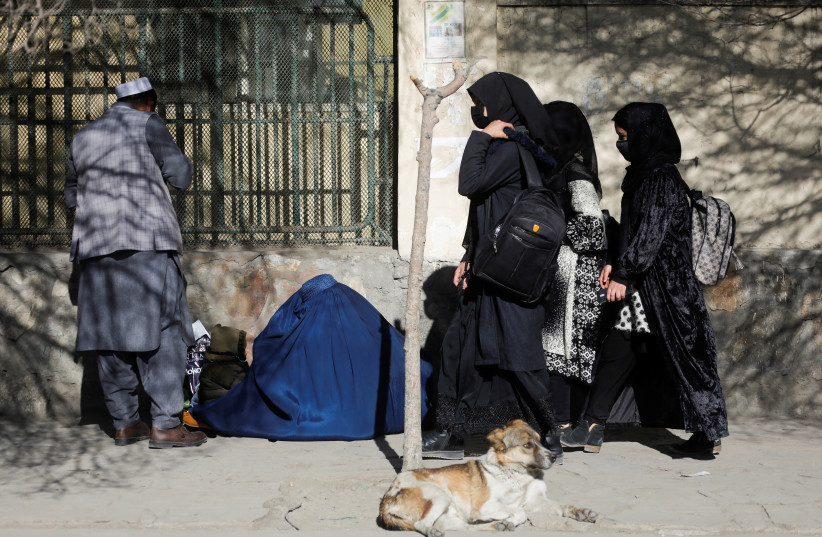Women are protesting in Afghanistan after the Taliban banned them from universities and work at non-governmental organizations, but very few men are joining their cause.
For more stories from The Media Line go to themedialine.org
The Taliban issued new laws forbidding women to take part in two additional activities that are considered part of daily life in the rest of the world. Since last week, women in Afghanistan have been officially banned from attending universities and other institutions of higher learning, and over the weekend the Taliban ordered national and international NGOs to stop employing women in Afghanistan.
In both cases, Taliban government officials allege that the reason for the ban is that the women are not observing Islamic dress code rules, including covering their faces and wearing dark colors.
The moves have been widely criticized by major players in the international community, including the United Nations, the United States and Canada; and by countries in the Islamic world such as Qatar, Saudi Arabia and Turkey, which called on the Taliban to reverse the bans.

It also has sparked sporadic nationwide protests by women, who are condemning the prohibition and demanding their basic rights.
"The elimination of women in Afghan society"
Selsela, a women's rights activist in Afghanistan who has been attending the protests in Kabul, says that when news of the university ban decree came in, women in Afghanistan were disappointed and felt hopeless.
"We understood that, after this, we don't have any possibility of a bright future in the country. This represents the elimination of women in Afghan society. There is no place for women in Afghanistan," she told The Media Line.
Selsela and her sister protested against the education ban on Thursday in Kabul together with other women and girls. But she stresses that she did not see any men backing them. "There were lots of women, but, unfortunately, there were no men to support the women," she said.
So far, the few men that have joined the protests are concentrated in universities. According to reports, male students in universities throughout Afghanistan joined the protest against the education ban by boycotting their exams.
Selsela recalls that there were shopkeepers in the stores located on the road where the protest was taking place who praised the women for demonstrating and, at the same time, asked for forgiveness for not participating.
"That was a horrifying moment and one of the moments in my life that I will never forget. We really felt that we are alone because there were no men among the women to support us," she said.
Taliban men surrounded the women who were protesting, Selsela says.
"The first thing that they did was call upon every woman, saying that they should not raise their voices. They had their guns with them," she said, adding that there were also female police officers at the protest with the Taliban.
The Taliban arrested five female protesters as well as three journalists who were reporting from and filming the protest.
Selsela also says that most of the women who participated in the demonstration were injured by members of the Taliban who tried to break up the protest; she describes their behavior toward the protesters as "worse than how one would behave to animals."
After the protests, "the Taliban ordered their intelligence and every post in Kabul and in Afghanistan to find these protester women, so then they can arrest the rest of them," Selsela said.
Ajmal Shams, vice president of the Afghanistan Social Democratic Party, and former deputy minister in the former government of the Islamic Republic of Afghanistan, told The Media Line that many Afghan women are afraid to attend the demonstrations out of fear of harsh treatment.
In addition, he said, “Some women have lost interest because their protest will not result in anything as the Taliban do not believe in democratic protests."
Zala Zazai, who served as a police officer in Afghanistan before she fled to Europe after the Taliban took over the country when the last US and other foreign troops left in August 2021, says that since the arrival of the Taliban, there have been many demonstrations by women, but all of them have been suppressed.
"Women were imprisoned, killed, raped and, in this recent demonstration, even acid was thrown at the girls of Herat Province, and more than ten women have been imprisoned," she told The Media Line.
She says that demonstrations last week took place throughout the country and were rather spontaneous.
"All the women's demonstrations and resistance were spontaneous, and women from different regions of Afghanistan participated in them. The Taliban's enmity is not against one woman, but against all of us," she said.
Zazai says that, recently, men have begun to take notice of the dire situation for women under the Taliban government. She notes that more than 50 university professors resigned to support women's right to an education.
Selsela calls for Afghan men to join the women's struggle. "The time has arrived, and the men should stand with their women, daughters and sisters because now we are passing the worst days in Afghanistan; it's the darkest period in Afghanistan," she said.
"Everyone is just watching as Afghanistan becomes a prison for women and girls," she adds.
Shams notes that the rationale behind the Taliban's actions "is clearly their ideology and their own interpretation of religion which is not seen anywhere else in the Islamic world."
No other religious scholar in any other country has supported their justification for the closure of schools, colleges and universities for girls and women, he added.
